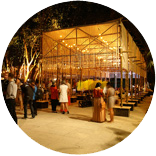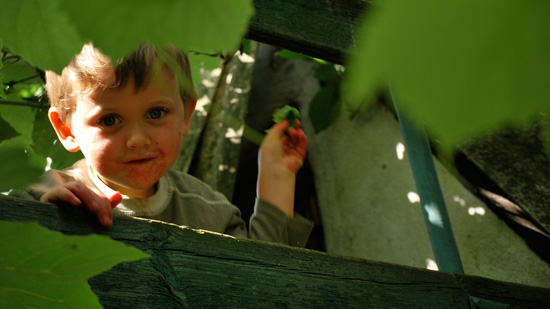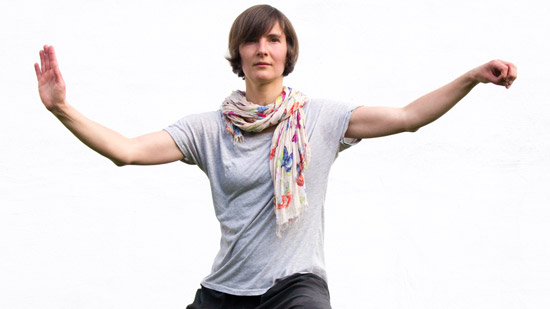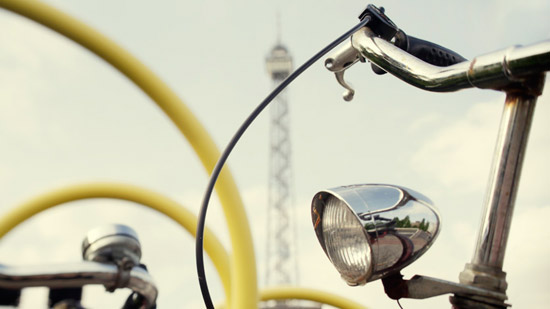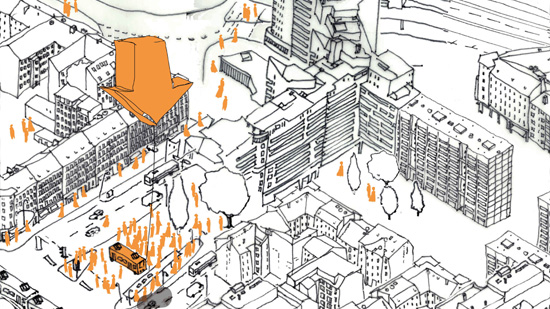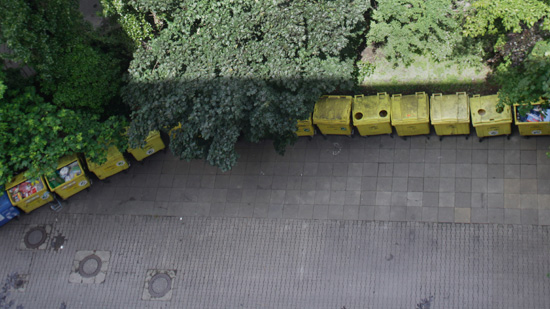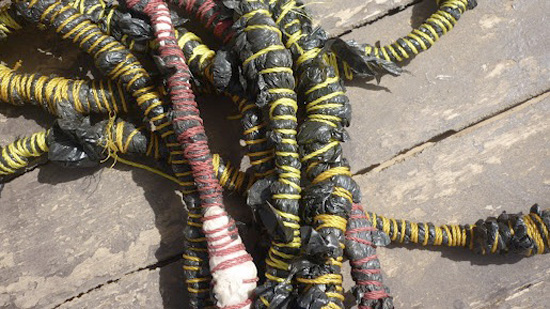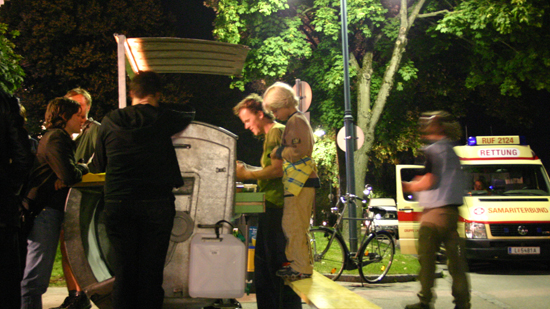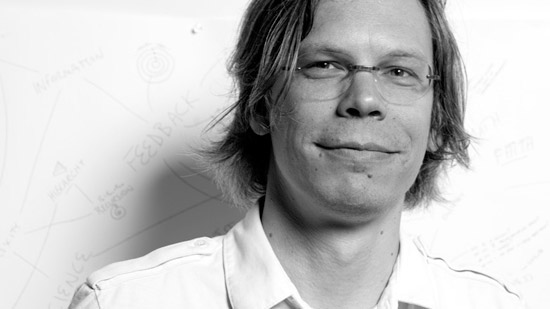July 19 2012
-
Today's topic: Tagesthema: Sanitary Cities Gesunde Stadt
Cities are often metaphorically compared to a living being. They have a personality; they have arteries through which traffic circulates; their parks are “green lungs”; and their fingers reach out deep into the hinterlands. Cities also have a metabolism—they consume material and produce waste, which is often transported over vast distances before it reaches its final destination.
Städte werden oft mit einem Lebewesen verglichen. Sie haben eine Persönlichkeit, Adern, durch die der Verkehr fließt, ihre Parks sind „grüne Lungen“ und ihre Finger reichen bis tief ins Hinterland. Städte haben auch einen Kreislauf – sie konsumieren Material und produzieren Müll, der oftmals weit wegtransportiert wird, bevor er sein Ziel erreicht.
-
Jul 19 10:30 am–3 pm
This City Life: Through the Eyes of Children Das Stadtleben: Durch Kinderaugen
While most children live in cities today, understanding, questioning and experimenting with the urban environment is rare. This workshop facilitated by Cameron Stevens proposes one way of encouraging children and young people to engage with their immediate urban surroundings.
Obwohl die meisten Kinder in Städten aufwachsen, ist die Auseinandersetzung und das Experimentieren mit der städtischen Umwelt in ihrer schulischen Ausbildung unterrepräsentiert. Cameron Stevens leitet eine Workshopserie, die Kindern und Jugendlichen eine vielfältige Auseinandersetzung mit ihrem städtischen Umfeld ermöglicht.
-
Jul 19 12 pm–1:30 pm
Chen School for Taijiquan, Qi Gong and Meditation Chen-Schule für Taijiquan, Qi Gong und Meditation
The complexity of city life often leaves us little time to stop, think, and connect with ourselves. Come to the Lab and let Swanhild Maaß (Chen School for Taijiquan) introduce you to the Chinese practice of meditation, movement patterns, and martial art.
Die Hektik des Stadtlebens lässt uns oft wenig Zeit innezuhalten, nachzudenken und uns unserer selbst bewusst zu werden. Lassen Sie sich von Swanhild Maaß von der Chen-Schule für Taijiquan in die Welt der chinesischen Meditation, Bewegungsformen und Kampfsportart einführen.
-
Jul 19 12 pm–2 pm
Cycling Lessons for Women (Beginners) Fahrradkurs für Frauen (Anfänger)
Cycling enables us to experience a new kind of mobility. Take part in a free cycling workshop for women that aims to foster self-confidence and engagement in daily life.
Fahrradfahren ermöglicht uns eine neue Art der Mobilität zu erfahren. Mach mit bei einem kostenlosen Fahrradkurs für Frauen, der anstrebt Selbstvertrauen und Einbindung im Alltag zu fördern.
-
Jul 19 12 pm–6 pm
Free Space Berlin/Freiräume Berlin: Berliner Liegenschaften
Free Space Berlin/Freiräume Berlin features an interactive online map that visualizes the locations of publicly owned plots of land in Berlin. A mobile workshop will visit six of these sites throughout Berlin currently undergoing a bidding or selling process to ask neighbors, visitors, and passersby what their vision for these free spaces would be.
Auf Free Space Berlin/Freiräume Berlin finden Sie eine interaktive Karte, die die Lage der Berliner Liegenschaften darstellt. Bei einem mobilen Workshop werden sechs dieser Standorte in ganz Berlin besucht, die aktuell ausgeschrieben sind oder verkauft werden. Dabei werden Nachbarn, Besucher und Passanten befragt, wie Sie sich die Nutzung dieser freien Flächen vorstellen würden.
-
Jul 19 2 pm–2:45 pm
Like living beings, cities consume material and produce waste. Lab Team member Carlo Ratti introduces the topic of the day: Sanitary Cities and the Senseable City.
Wie ein Lebewesen konsumieren Städte Material und produzieren Müll. Lab-Team-Mitglied Carlo Ratti stellt das Thema des Tages vor: Gesunde Städte und die Spürbare Stadt.
-
Jul 19 3 pm–7 pm
Dissected Trash Objects Sezierte Müllobjekte
Join in as we collaboratively confront our own trash by dismantling and analyzing individual pieces of locally sourced trash with the help of scales, barcode readers, open-source databases, and waste-management data.
Begleite uns dabei wie wir gemeinsam unserem eigenen Abfall gegenüberstehen und einzelne Teile des örtlichen Abfalls mit Hilfe von Waagen, Barcode-Scannern, Open-Source Datenbanken und Abfall-Management-Daten auseinandernehmen und analysieren.
-
Jul 19 3 pm–7 pm
Soupermobile: Build a Dumpster Kitchen Soupermobile: Bauen Sie eine Müllcontainer-Küche
Convert a trash receptacle into a functional kitchen in this two-day workshop.
In diesem zweitaegigen workshop entwickeln wir eine funktionale Küche aus normalem Abfall.
-
Jul 19 8 pm–10 pm
Can Infrastructure Be Crowdsourced? Kann Infrastruktur durch die Masse selbst organisiert sein?
What if waste collection was put in the hands of citizens? Dietmar Offenhuber explores the possibilities and limitations of self-organized urban infrastructure.
Was wäre, wenn die Müllabfuhr von den Bürgern übernommen würde? Dietmar Offenhuber erforscht die Möglichkeiten und Grenzen selbstorganisierter, urbaner Infrastruktur.

